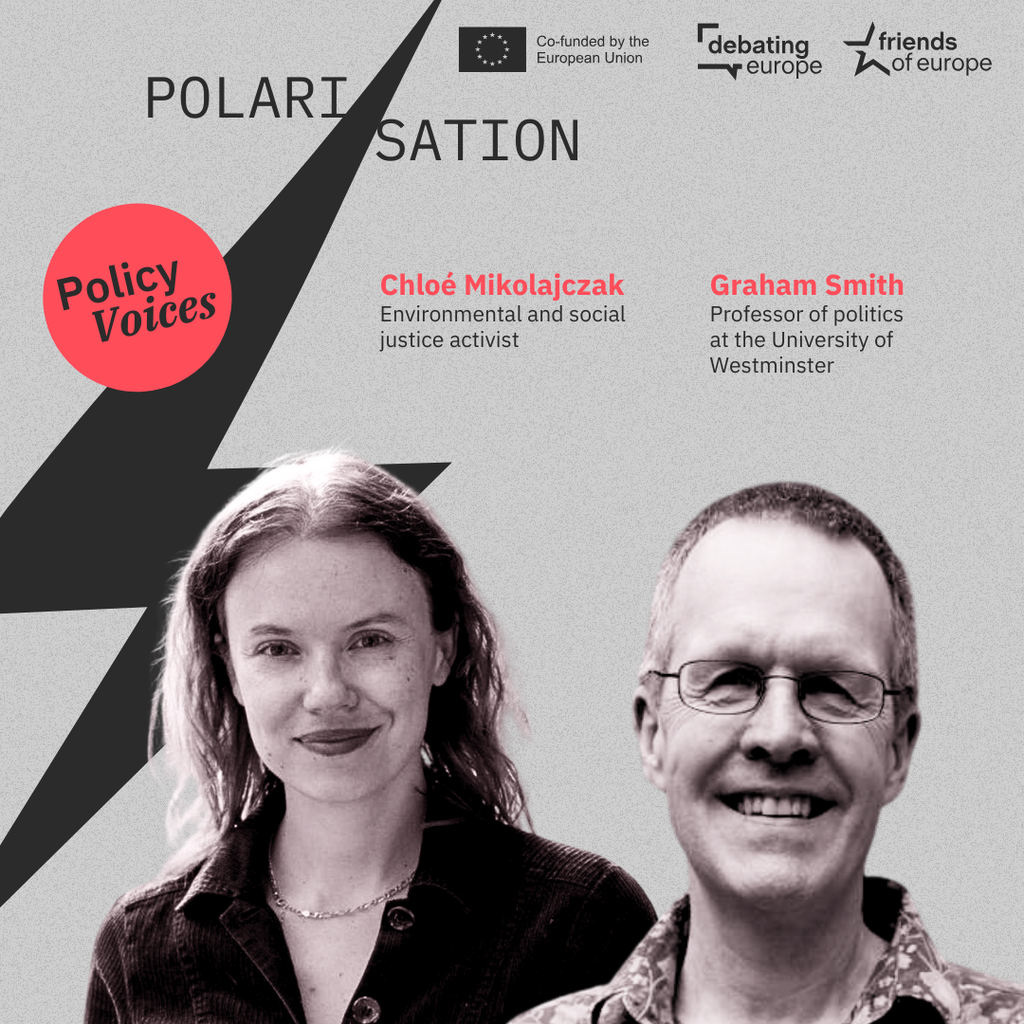Climate and Energy Summit 2025
Next event In person & livestreamed

- Area of Expertise
- Climate, Energy & Natural Resources
Climate, Energy & Natural Resources

Founder & Managing Director of Women's Worldwide Web (W4), Senior Fellow for Women, Peace and Security at Friends of Europe and 2012 European Young Leader (EYL40)
The global rise of youth climate movements, fired up by the ‘Greta Thunberg Effect’, attests to the power of digital technology to mobilize young people. As the world faced lockdowns due to COVID-19, youth activism became more digital and disruptive. Naturally adept at social media, online campaigns, crowdsourcing and crowdfunding, young people can skilfully utilise and deploy digital technologies to amplify their voices. Digital also has the potential to connect youth with government leaders and decision-makers, offering them an opportunity to participate in the critical decisions, policymaking and actions that will affect them most. This potential must be realized. According to the “#YourVoiceYourFuture – Turning challenges into solutions” report published by UNICEF, the EU, and the African Union, over two-thirds of youth want to play a role in the green transition, but close to 60% say the main obstacle is a lack of access to policymakers.
The European Climate Pact is a critical initiative to engage youth voices as part of an ambitious cross-sector movement to galvanize society-wide climate action. As the Connected Europe report underscores, citizens must be at the heart of the push towards an aligned and integrated green-digital transition. This depends on nothing less than a paradigm shift—and youth need to be equipped, empowered, and engaged to drive it.
The EU’s Pact for Skills is designed to provide youth with future-proof employment skills, particularly digital skills. While there’s much hope in the potential of digital technologies to catalyse progress towards a climate-neutral EU, Europe currently suffers a highly costly (multibillion-euro annually) supply-demand mismatch in ICT skills, plus an alarming digital gender divide. All this is against the backdrop of a global digital chasm. Of the 2.9bn people still offline, an estimated 96% live in developing countries. In Sub-Saharan Africa, the world’s least connected region, the population is projected to double by 2050 to 2.2bn, with half of that population under age 25. Meanwhile, an estimated 11mn young people join the African labour market each year, yet the continent generates only 3.7mn jobs annually.
It’s not hyperbole to call this situation a ticking time bomb.
If we are to stave off apocalyptic planetary degradation, climate action will have to be our modus operandi, synonymous with how we live, work, and consume, online and offline. As countries grapple with a nexus of multiple crises across health, education, economics, and environmentalism, governments and key stakeholders everywhere urgently need to invest in the digital capacity-building and green skills of their youth to build resilience and drive the digital-green transition.
For anyone who does not have an elastic relationship to truth and science, it’s tragically obvious that we need systemic change
The study entitled “A new green learning agenda” published by the Brookings Institution calls for the transformation of education systems, to expand the definition of “green skills” beyond the technical skills required for labour force outcomes. Its mission is to encompass a much broader spectrum of skills required for a green transformation, ranging from technical “skills for green jobs” like ICT skills, innovation and environmental awareness, to “skills for a green transformation”, such as political agency and environmental stewardship. A recent study on climate change education (CCE) estimates that if just 16% of secondary school students in upper-middle- and high-income countries were to receive CCE, we could reduce carbon emissions by 18.8 gigatonnes between 2020 and 2050—a better outcome than three-quarters of the top climate solutions available to us today. Yet, an analysis of 160 Nationally Determined Contributions (NDCs) showed that, so far, education is missing the mark.
Education systems must themselves be transformed to enable youth to drive the transformation of our social and economic systems and foster the shift in mindsets needed for widescale climate action. Otherwise, we risk merely putting a ‘green’ label on our existing unsustainable systems. Young people recognize this, as the recent ’Uproot The System’ demonstrations show. For anyone who does not have an elastic relationship to truth and science, it’s tragically obvious that we need systemic change.
The transformation of education systems must also prioritize gender-transformative education and gender equity. Project Drawdown evaluated the potential of 80 methods to reverse global warming and reported that empowering women and girls, through education and the protection of their sexual and reproductive health and rights, hits the top of the list of most impactful solutions.
The EU and member states must take the global lead in this: it’s a precondition to deliver on the European Green Deal
Of course, we also need to build the public and youth’s trust in digital. A study of Millennials and Gen Z’s increasing tendency to source news from social media aptly cautions, ‘everyone’s at the party, but where’s the trust?’ The EU & member state governments need to make cyber-safety and cybersecurity training available in schools, companies, and local governments, to better equip citizens to protect themselves from misinformation, disinformation, and fake news. They must also work to ensure a robust regulatory framework that protects citizens’ and consumers’ rights. The EU must deliver on its proposed framework of digital rights and principles, included in the EU’s Digital Compass, and take the lead in establishing ethical regulatory frameworks governing the digital space. Europe’s ‘normative power’ is critical. There’s so much at stake, and arguably, it hinges on upholding European values and liberal democracy, alongside the preservation of the planet.
We are only just beginning the vital work of driving an integrated green-digital transition, unlocking the potential of frontier technologies to transition to a circular economy, while improving our understanding and management of our digital footprint and ever-increasing e-waste. And time is running out. Young people need access to the requisite skills to enable them to be part of the solutions and to navigate the social, economic, and environmental challenges the world faces. The EU and member states must take the global lead in this: it’s a precondition to deliver on the European Green Deal and a make-or-break for the health of the planet, particularly the health and safety of young generations.
In the words of UN Secretary-General António Guterres: “[Our] generation has largely failed until now to preserve both justice in the world and to preserve the planet. It is your generation that must make us be accountable to make sure that we don’t betray the future of humankind.” This is not defeatism, but galvanizing honesty.

This article is part of our European Climate Pact series. The European Climate Pact is a movement of people united around a common cause, each taking steps to build a more sustainable Europe for us all. Launched by the European Commission, the Climate Pact is part of the European Green Deal and is helping the EU to meet its goal to be the first climate-neutral continent in the world by 2050.
Learn more about the European Climate Pact here.
You may also like…
Next event In person & livestreamed

Past event In person & livestreamed

Past event In person & livestreamed

Past event In person & Livestreamed





Stay informed
We use cookies and similar technologies to adjust your preferences, analyze traffic and measure the effectiveness of our campaigns. Learn more about our privacy policy.